
| Feature Article |

By Hirst
This story takes us back to the very early 1990s – Gulf War, Bill Clinton, L.A. Riots, etc. Big world events, but I was just some ordinary working-class kid in Northern England, so I was more about watching The Brittas Empire with a plate full of Campbell’s Meatballs in Gravy and a can of Shandy Bass. My awareness of news events came from watching puppets bray each other on Spitting Image. My understanding of global culture via Going For Gold with Henry Kelly. The most momentous and earth-shattering event to me was the introduction of Peperami Hot. In summary, an absolute cretin.
At that time, I’d already got a Sega Mega Drive, as did my good friend ‘JB’ who went to the same school. I barely knew him before then, with our friendship developing through our mutual gaming exploits, sharing games and information. The first time I went round to his house, he was sat on the bed playing on a standard PAL Mega Drive rigged up to an ancient black-and-white Bakelite portable, with the Japanese version of Bonanza Bros playing through a Honeybee cartridge adaptor. What a pro. Didn’t offer me to get me a drink or anything though. He was great at games, less so at hospitality. Probably didn’t want me to use up the dilute orange.
As an aside, black-and-white TVs? Still fairly common as a secondary set at that time, though rarely referenced in pop culture. Their survival was partially due to their resilience compared to unreliable old colour sets, but also because somebody at some point will have paid a fortune for it. How could you throw it away? Great Uncle Geoff paid an entire year of his wages from the asbestos factory for that, probably. JB was probably unique in our circle of friends for actually playing games on a B&W TV, certainly for as long as he did (I’m fairly certain he plugged a Saturn into it), but JB’s family didn’t have much cash. He earnestly thought a single slice of buttered bread qualified as a sandwich and slept top-to-tail in the same bed as his little brother. Mega Drives though, unlike bunk beds, could be obtained from the local catalogue shop on weekly payments. Ultimately, this meant we sometimes had to pretend we weren’t in whilst bailiffs banged on the door about it.
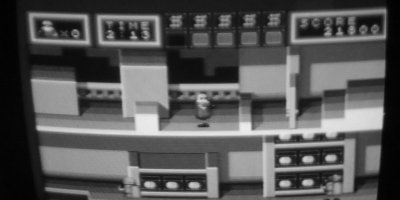 Bonanza Bros - in B&W! It’s difficult not to think about the money side as by far the biggest culture shock in moving across from 8-bit micros to a new 16-bit console was the price of software. At the time, a computer game for your average micro (ZX Spectrum, C64, CPC, etc) on cassette could be as little as £1.99, but rarely above a tenner. On the other hand, a newly released Mega Drive cartridge from a retail shop would be somewhere around the £40 mark, which was Big Money – nearly £100 adjusted for inflation. Perhaps you might get a game for your birthday, or Christmas, or if somebody put you in their will and died, but saving up £40? That was about three years of The Beano. The days of self-sufficiency, largely being able to buy our own games with pocket money, were well and truly over. We needed to figure a way round it. Preferably a way that didn’t involve getting a job, as this isn’t a coming-of-age story about the merits of hard work. One obvious solution was to extend our circle of friends to basically anybody who had games we might be able to borrow, with diplomatic missions to establish trade deals between various Mega Drive owners. I’ll lend you my Golden Axe for a week if you lend me your Super Hang-On. The usual nonsense. Unlike the days of games via cassette, you couldn’t copy it onto a blank tape using the Hi-Fi and keep it forever, but it was better than nothing. I did occasionally copy gameplay footage onto VHS to make a record of some games for posterity, but this sadly did not allow you to play the game. Just to mention, one of my mates reckoned recording footage of games would damage the game cartridge and was terrified that it would ruin his games if I did it. I did attempt to very carefully explain that recording video footage of his copy of James Bond 007: The Duel would hurt the game as much as recording an episode of Blockbusters would hurt Bob Holness, but it was easier to engage idiot protocol – ‘OK I won’t’ and then I just did it anyway. That’s the great thing with idiots; you can just say one thing and do another. In any case, hurting that game would have been doing it a favour. Very slippery controls.
 Flashback ad, from Sega Magazine (Feb 1994) Borrowing games was quite sustainable in those days (where you know a ton of people from school), but running through increasingly sketchy leads resulted in a mission where we went into the heart of a notoriously rough housing estate to lend Flashback from a girl we vaguely knew, with a probably imagined – but very real to us – chance of having our heads kicked in by street toughs. We got hyped up to go there, then legged it all the way there to find they weren’t in – nightmare. We then had to retread our steps and do it all over again later, like getting the good ending on Ghouls and Ghosts. Despite our expectation of the estate being somewhat like Escape From New York, we didn’t see any roaming mobs. I’m guessing they must have roamed off somewhere else, it was a nice day. Still though, if you were going to be killed over a Mega Drive game, Flashback wasn’t a bad choice – 9/10 game, all day long. Imagine if you’d risked life and limb for Greendog: The Beached Surfer Dude! Whilst I love free games more than any other type, there were only so many doors you could knock on, cousins we could hassle and friendships we could exploit. Enter the murky world of commercial Game Swaps. Over on the outdoor market, you could trade games at relatively low cost. Several stalls offered this service, but one was by far the best. Despite the area being long-gone (demolished and gentrified into a shopping precinct), I can still remember it like it was yesterday. Past the Fish Market, left at the brick burger shed, right on the far edge, second row from the slot machine arcade. Can’t miss it, just look for the problem gamblers turning their empty pockets out like Rodney in the intro to Only Fools and Horses. The stall itself was a standard single outdoor market unit, a counter made of wooden planks and a roof to (mostly) keep the rain off. Games of various formats were laid out on a cloth, separated by format and price. More expensive games stood upright in wooden cases at the back, held in place by grubby elastic straps. Power was provided, with a portable TV and console setup allowing him to test cartridges and go ‘See? It works fine! No refunds. Go away’ and wave in a motion you’d use to shoo away a dog.
 The actual stalls (but with fruit on them), contact me if it's you! In its initial incarnation the stall was very Sega-biased, as were most – Nintendo dithered so long with European markets that it allowed their main rival to hold the dominant position, so there was simply more Sega software to go around. The ratio would even up more over time, but I don’t think it ever completely equalised. Sega titles would be shoved to the left of the stall, Nintendo to the right, more obscure formats (CDi, 3DO, Jaguar) languished somewhere in the middle. Actual computer games (IBM, Amiga or micro) weren’t sold at all, probably due to the difficulty of testing them. As with most outdoor market stalls, it had no official name (or tax returns). As the stallholder did game swaps and was a man, we unleashed the enormous creativity of our minds to come up with his catchy name - Swap Man. It wasn't used to his face, more of an internal reference, like ‘Are we going to Swap Man?’ or ‘Did you see the state of Swap Man’s jacket potato? He’s put cheese, curry and gravy on it’. Swap Man himself was a chubby guy in a scruffy winter coat and incongruous leather deerstalker hat, somewhat surly and monosyllabic, but not particularly intimidating. I’d like to say we eventually built up some kind of rapport with him, but I think the best we ever got was a greasy potato-filled weak grin and a mumbled ‘alright’. He didn’t look like he played games, we never dared ask. To say he was the nicest game trader would be attributing undeserved praise, so we’ll go with him being the least bad of a miserable bunch of men who were unlikely to pass a CRB check. The market swap system worked like this – if you had Super Monaco GP (worth £14.99), you could trade for Alien Storm (also worth £14.99) by giving him the swap fee of £2. If the trade-in wasn’t already on the stall, he’d come up with a price. All games had to be complete with manual, imports were allowed, and cross-format swaps were acceptable. You could also trade up to more expensive games by paying the difference, but no credit was given for trading down to cheaper ones. More fool whoever paid £2 to give him a more expensive game, but I saw several chumps do it. I mean, Swap Man wasn’t going to tell them. Why would he?
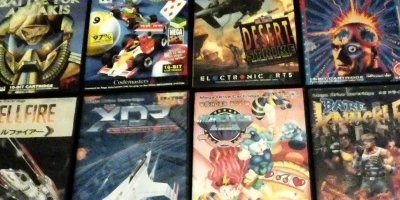 Imagine this, but maybe 100 games Throughout the early to mid-1990s, the swap system became the mainstay of how we obtained games, with almost every Saturday morning being devoted to the task of visiting Swap Man. Even if not swapping games, checking the prices of your existing game stock portfolio was a must – you wouldn’t want to be holding onto a game that wasn’t holding value, potentially limiting your game swap choices to bottom row untouchables like World Cup Italia ’90 or Sword of Sodan. It was our Stock Market, albeit a rather pathetic one. In our world, game market prices should have been on the news. ‘And on the Mega Drive markets, bad news for owners of Dragon: The Bruce Lee Story…’ Watching game values change was kind of a game of its own, seeing how fast they would drop based on supply and demand. Review scores could say one thing, but a game losing value by a tenner in a single week said another. Rise of The Robots dropped like a stone, as might be guessed. You would also notice that well-liked games with strong replay value would plateau at a good price and remain there by consistent demand. Thankfully, this was long before the dreadful American-style collector market appeared in the UK and pushed loads of mediocre but rare games into triple figures. Games were for playing, not as an authoritative-looking background for YouTube videos where you read things off Wikipedia verbatim or beg for donations to buy more junk from CeX. On this subject, Computer Exchange (CeX) came into existence around this period. We were very familiar with their magazine ads with accompanying ‘Here’s Toby!’ comic, violently illustrated by Charlie Brooker – of all people. At that time though, I don’t think they’d even expanded from their first London location. For a couple of Northern kids, a shop in London might as well have been on The Moon. At that point, all I really knew about London was what the map looks like in the board game Scotland Yard, some areas featured in the ZX Spectrum game Hampstead, the bit in European Vacation where Clark Griswold is too American to comprehend a roundabout, and vague knowledge of it having some giant Sega arcade with R-360.
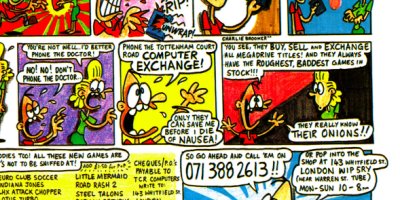 Computer Exchange ad, from Mean Machines Sega (Feb 1993) Back in the grim North, me and JB worked in close co-operation to get through as substantial an amount of the Mega Drive library as our limited funds allowed, co-ordinating our purchases to negate overlap. Every Saturday, pretty much without fail, we’d both be down the market for swaps. As a result of teamwork, we went through literally hundreds of swaps and lower-end purchases, usually making decisions by mutual agreement. We also expanded into Master System territory by picking up a Power Base Converter (everyone called them a Master System Converter - plugs in the Mega Drive to allow Master System games), nominally mine but frequently lent out, with the lower price point of games giving something meaningful to do with Mega Drive games where the trade price had hit rock bottom. Whilst £9.99 on the Mega Drive was dregs territory, over on the Master System it could get you something pretty good. Probably quite old, but good. My memories of other stalls are rather limited due to their usually weak selection and more transient nature, though I do remember us picking up a rare US Genesis import of Beast Wrestler (not a fantastic game but had a weird charm to it) from a stall that only turned up for a single week. I also picked up a Sega Card of Bank Panic from another, which I’ve still got. And one fine summer day I picked up an unusually cheap copy of Haunting: Starring Polterguy from a guy who mostly sold VHS tapes, which traded for a fiver more than I’d paid. Great deal, alright game. There was one other game stall on the market that really stayed in my memory, the only other that had any kind of staying power. It was one row away, run by a younger guy with spectacles we called Con Man. He did not generally offer swaps, and my memories are vague as to exactly when he picked up the nickname, but it was likely the result of a deal gone awry involving JB trying to obtain Lethal Enforcers and the Konami Justifier light gun. I can’t remember the specifics, but he wouldn’t even look at his stall for weeks. Unlike Swap Man, Con Man was happy to sell games without manuals, which a lot of people wouldn’t touch – but he was even happier if the customer didn’t know about it until they got home. ‘I’ll just wrap it up in brown paper for you to keep it safe’ he’d say, opening the case under the table to shove the cartridge into place. All in all, an absolute rotter – to be visited at your peril.
 The Market House, Source Unknown - if it's you, tell me Adjacent to the outdoor market, there was also the Market House, which wasn’t just a place to buy knitting patterns, chocolate dog drops and giant underpants – it also had a single game shop. It was on the mezzanine floor and I believe it was the precursor to Ninja Games (a now long-gone local chain). I don’t remember buying anything from there, though I do remember repeatedly going up there to look. I also managed to persuade a friend not to buy a used Atari Jaguar from them. Before any Jaguar fans get defensive, it was far enough into the lifespan to see a clear death spiral, so I was doing him a favour. He eventually saved up a bit more and got a new Mega Drive II. Besides the second-hand options, there were the new games in high-street shops to check out – notably at the dedicated game shop Future Zone but basically anywhere else that stocked them. At that time, games were available in a wide range of places – Woolworths, Dixons, Argos, Comet, Rumbelows, a plethora of independent shops, basically anywhere with a vague connection to electricals or entertainment would try stocking them. In retail terms, console games were the 1990s equivalent of vapes, turning up in all sorts of incongruous locations as various unlikely candidates tried their hand at selling games. For several years, you could buy Sonic the Hedgehog in Boots the Chemist. It was easy to lose a few hours just window-shopping for games, reading boxes and watching gameplay footage looped on TVs. Not to mention going through all the gaming magazines in the poor man’s library, WH Smith – which also sold games! Once we’d filled our boots with gaming intel, we’d usually both go back to my house to check out our new games, being that my house was nearer to town and had a marginally better TV. Whilst it was an ancient Baird ex-rental with massive scratches in the middle of the screen, it was at least colour – wobbly, blurry, inaccurate colour. A solid afternoon-to-night of gaming would ensue, usually accompanied by a pathetic banquet of rock-hard frozen microwave burgers, No Frills brand Swiss rolls, a bag of economy popcorn and grim supermarket-own cola. Or if we’d gone to his house, buttered bread, tap water and get lost.
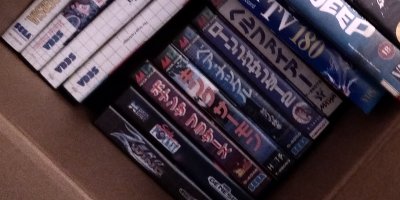 Handful of my old games, lurking in a box On reflection, our experience of constantly swapping games away does mean that I never ended up sat on a huge collection of games, barely going above a total collection of around a dozen Mega Drive titles at any time. With the sheer number we got through – I would conservatively estimate over 300 games, maybe with the odd repeat – it goes without saying that we went through titles that would be worth a small fortune had we kept hold of them. Games that I’d love to own today, but I’m not paying £200 for Mega Drive games. I’m still glad I played them at the time, back when I had all the time in the world to play them. If I had them now, I’d be lucky to have any spare time to do much beyond briefly glancing at them on an increasingly dusty shelf as I walk past stressing about wages, car insurance or mystery knee pains. As the 1990s rolled on, the Mega Drive era naturally drew to an end, as did our swaps for it – but what became of the game traders on the market? Well, those who remained there moved onto the new gaming formats, but it was not to last. Con Man tried to screw me over with a scratched copy of Syndicate Wars on the PS1 that wouldn’t even get past the intro, though he reluctantly refunded me (and put it straight back on the stall). He disappeared shortly after, so I’m going to take personal credit for destroying his business empire before The Cook Report got to it. Good riddance. As for Swap Man, despite the competition gradually disappearing, his stall was didn’t last much longer itself. The very last game I remember getting from him was the excellent Dark Savior on the Saturn, so it’s nice to think that it ended on a high point. I would like to think that he managed to fold his profits into running a successful independent game shop somewhere, but I suspect he was pushed out of the business by increased competition, rampant PlayStation piracy, and the managed decline of the market itself.
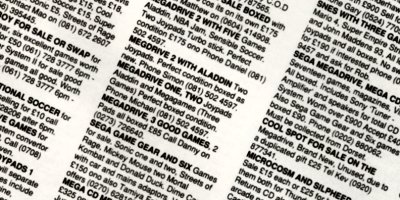 Swap ads, from Mean Machines Sega (Nov 1994) Either that, or he got fed up with children quietly laughing at his sad coat and rubbish hat and finally snapped – threw his portable TV into the road screen-first, crushed a paper cup full of scalding hot tea in his bare hands, stamped his jacket potato lunch into the ground, then wandered away shouting at the sky until he was taken out by a police marksman. Swap Man, wherever you are, I hope there’s a lot of jacket potatoes. And if you are where I think you’ll be, no shortage of fires to roast them in. I’m joking, that fate was reserved for Con Man. Try getting £20 for your knackered Syndicate Wars down there, pal. Don’t forget the brown paper. --- Thanks for reading this far, I hope this article was of some use to you. I haven't written anything about computer games for about 20 years and I can say it was a lot more fun when you used to be given free games in exchange for it, but I might do some more if fancy takes me. Any feedback, complaints or violent threats to my BlueSky account: BleedingCart --- Attributions
Flashback ad (Sega Magazine (UK): Feb 1994) via Segaretro.org |
